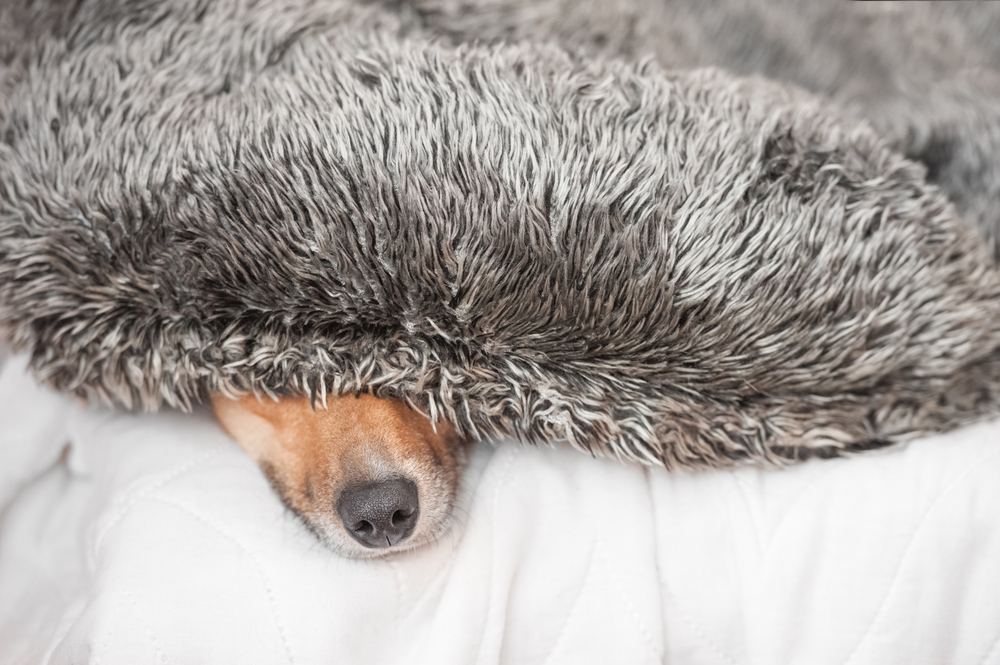Canine Noise Aversion: When the Sounds of Summer Frighten Your Dog
 Loud noises from fireworks, summer thunderstorms, loud TV sounds and boisterous gatherings can be a source of anxiety for pets, as many dog owners know. Dogs that exhibit signs of fear and more extreme reactions to loud noises have Canine Noise Aversion, classified as a canine phobia or anxiety disorder.
Loud noises from fireworks, summer thunderstorms, loud TV sounds and boisterous gatherings can be a source of anxiety for pets, as many dog owners know. Dogs that exhibit signs of fear and more extreme reactions to loud noises have Canine Noise Aversion, classified as a canine phobia or anxiety disorder.
Behaviors associated with Canine Noise Aversion
Owners whose dogs are afraid of fireworks and other extremely loud noises are probably all too familiar with the signs of their pet’s suffering. Behaviors range from general clinginess to trembling, crying and hiding. A pet may also dash around, whine, chew or lick more than usual, and even try to flee from the house or yard. Noise aversion can worsen over time so let’s look at steps to calm the terror in the moment and how to help reduce it over time.
How to know if your dog’s reaction is normal or problematic
It may be perfectly normal for your dog to react or be scared by an unexpectedly loud noise, especially if it is the first time they are exposed to it. Veterinarians advise owners to monitor the intensity of their dog’s reaction, and how long the reaction lasts. When those booms and claps start, you as the owner can likely gauge your pet’s level of noise anxiety better than anyone.
Noise aversion is a term encompassing a spectrum of behaviors, anxieties and degrees. If your dog is briefly startled or only mildly agitated, and episodes are infrequent, you may want to start by soothing them and helping them feel safe in their environment.
If symptoms are frequent or more pronounced, it may be time to consult your veterinarian about combining environmental management with occasional drug therapy. A U.S.-based study reports that 40 percent of dog owners seek treatment from their veterinarian for a pet with occasional noise anxiety. 20 percent look for solutions on their own, and the remaining 40 percent do not seek any treatment at all.
If you observe that your dog has a severe reaction to loud noises (and because noise aversion can increase over time), it is negatively impacting your dog’s well-being and we recommend consulting a Veterinary Behavior Therapist to help reduce your dog’s noise anxiety.
What interventions work for canine noise aversion?
Managing your environment should be your first choice. Guide your dog (or other pet) to a safer room, such as one without windows. For the dog that isn’t overly scared, play with them using a favorite toy as a diversion. Play soothing music or a light TV show that will distract or calm them.
Never force a dog in hiding to come out. Be patient and don’t escalate the situation. Reassure your dog with steady praise and a calm voice. Allow them to feel secure by remaining in their hidden safe place.
Certain medications can reduce anxiety. A fairly new FDA-approved anti-anxiety medication called SILEO® (dexmedetomidine oromucosal gel) is specifically formulated for treatment of canine noise aversion. Your veterinarian is able to prescribe SILEO, an antidepressant including SSRIs, benzodiazepine, or other medication.
Millions of pet owners have found relief with the Thundershirt® (or by using a DIY close-wrapping technique with linens) to create a feeling of tightness and security that soothes anxiety in dogs.
Behavioral modification can also help dogs with more intense canine noise aversion. Some improve when exposed to a recording of the noise they are scared of in a safe environment. By starting at a low level and gradually increasing the volume, the dog may become desensitized to the noise.
No one enjoys living with an anxiety or phobia. Help ease your pet’s noise aversion by using one or more of the means above. Also, make sure that your dog has tags, a microchip and/or a GPS collar as more dogs run away from home on 4th of July than any other day of the year.
Lastly, talk to your veterinarian about the severity of your dog’s reaction and the best way to help. If your dog has severe and frequent anxiety that could benefit from behavior modification, contact Oakland Veterinary Referral Services about a veterinary behavior consultation, or ask your veterinarian to refer you.


